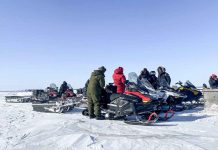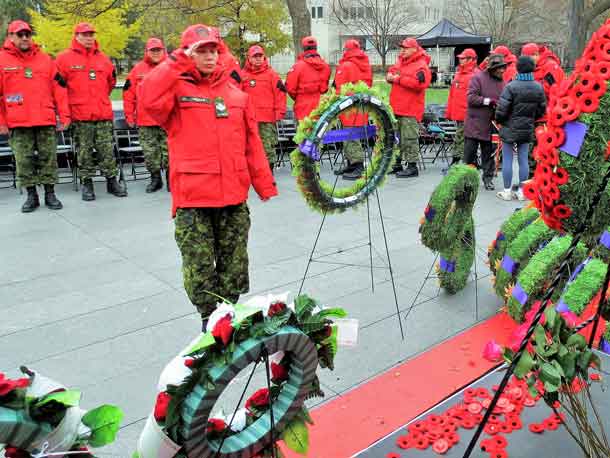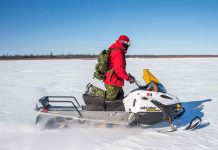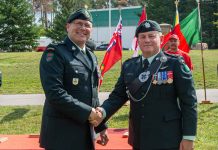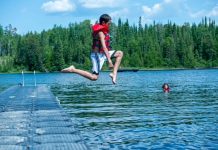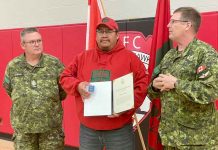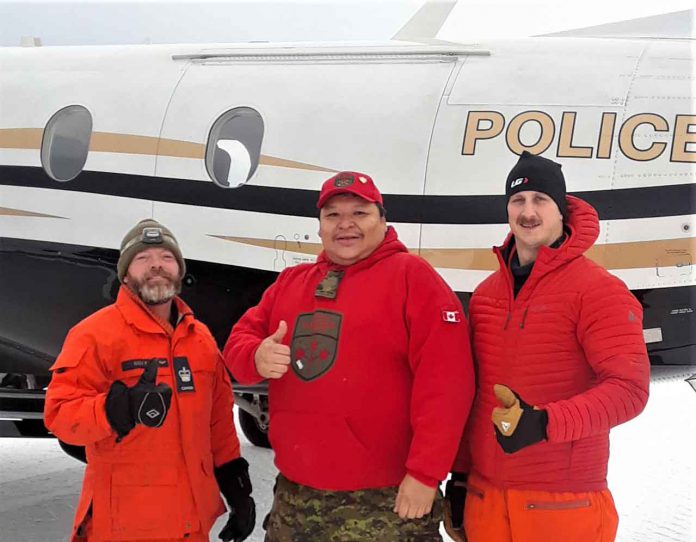
By Peter Moon
A hunter suffering from a serious gunshot wound was rescued from an isolated location in the bush of the Far North of Ontario as a result of the combined efforts of the military and civilians
The rescuers included search and rescue technicians from the Royal Canadian Air Force, Canadian Rangers from the Canadian Army, medivac pilots, and civilian volunteers.
They were called on to assist when a hunter from Wapekeka First Nation was shot in the shoulder. He was one of a hunting party of four from the small Oji-Cree community, who had harvested a moose for a community feast. Wapekeka is 610 kilometers north of Thunder Bay.
The hunters were about 30 kilometers south of nearby Kitchenuhmaykoosib First Nation when the man was shot. Details of the shooting are unclear, other than he was hit in the shoulder. The wound bled heavily while he lapsed in and out of consciousness. The temperature with wind chill was -34C. They phoned for help.
Because of bad weather conditions, the Ontario Provincial Police were unable to respond immediately and asked the Canadian Army for help. Canadian Rangers, who are part-time army reservists, were authorized to go to the aid of the wounded man.
“They were in an area where a helicopter could not land,” said Sergeant Spenser Anderson, commander of the Ranger patrol in Kitchenuymaykoosib, “And it was a rough trail for snowmobiles to get there.”
A Royal Canadian Air Forces CC-130H Hercules with two search and rescue (SAR) technicians on board was sent to the incident scene from Winnipeg and began dropping flares. “They lit up the whole south shore of Big Trout Lake,” Sergeant Anderson said.
The SAR technicians parachuted in the dark. They erected tents and began treating the hunter’s wound. Rangers from Kitchenuhmaykoosib and Wapekeka arrived shortly afterwards and began cutting down trees to clear a safe landing zone for a medical helicopter, which landed in the dark.
The wounded man was flown in the helicopter to Kitchenuhmaykoosib where a fixed-wing medivac plane was waiting to fly him 650 kilometers to a Winnipeg hospital. “It took 10 minutes to transfer him from the helicopter to the plane,” Sergeant Anderson said.
The rescue party from Kitchenumaykoosib consisted of Master Corporal Logan McKay, Corporal Craig Sainnawap, Ralph Hudson, a former Ranger, and Barry Anderson, a local trapper and guide. “I’m proud of what they did,” Sergeant Anderson said. “Everything worked out great.”
“This demonstrates again the ability of the Rangers, despite the rugged night conditions, to get to the aid of a casualty,” said Major Charles Ohlke of the Canadian Army, “and the ability of the army to work jointly with the RCAF in a difficult situation like this.”
“It’s a lot more time consuming and difficult when you have a situation like this one,” said Sergeant John Meaker, the OPP’s provincial search and rescue coordinator. “With so many people involved in a rescue in a remote location, it shows the effort that Canada will go to assist someone in serious trouble. The air force provided tremendous support and their SAR techs have amazing medical and physical training.”
(Sergeant Peter Moon is the public affairs ranger for the 3rd Canadian Ranger Patrol Group at Canadian Forces Base Borden.)

